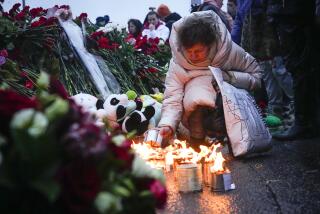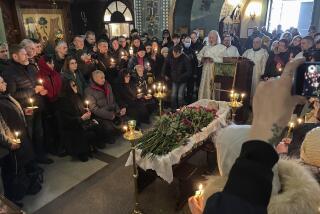Moscow Victim Is Buried in L.A.
- Share via
Sitting in her West Los Angeles apartment, Lyubov Burban fingered the document issued last week by a Moscow coroner. With numbing vagueness, it chronicled the death of her only son: “Cause of death: Investigation in progress.... Victim of terrorist crimes.”
“It was not terrorism,” she said, anger piercing her grief. Her husband, Mark, finished the thought: Their son, he said, “was killed by the Russian state.”
Grigory Burban, 39, was buried Tuesday in a simple, wrenching ceremony in Hollywood, 6,000 miles from the Moscow theater where he and more than 100 other hostages died last month. Burban, a Ukrainian citizen who was a permanent resident of the United States, was among two people from this country known to have died in the hostage takeover.
For those who knew and loved him, it was an inconceivable end -- a thunderbolt, a random injustice -- to a man known as a kind-hearted bridge between two worlds.
“It’s mind-boggling to think about it,” said a friend, Alexander Livitz, a software engineer who went to college with Burban in the Ukrainian city of Odessa and came to his funeral from Walnut Creek in the Bay Area. “He didn’t even have any relations or friends in Moscow. He was just in the wrong place at the wrong time.”
Burban’s death, and the way it was handled by the Russian government, struck his family -- which came to the United States from Odessa less than a decade ago -- as a chilling throwback to the system under which they had lived for years.
“If I had any illusions whatsoever -- and I did -- that things had changed there, this time all my illusions disappeared,” said Ilya Teplitsky, a cousin. “It’s like going back to the worst Soviet times, you know?”
Rebels from the breakaway republic of Chechnya seized the Moscow theater and about 750 hostages Oct. 23, threatening to blow up the building if Russia did not comply with a demand to begin a military pullout from Chechnya. Rather than give in, Russian special forces pumped a knockout gas into the theater two days later, instantly incapacitating the 60 hostage-takers -- as well as the hostages.
Russian authorities, led by President Vladimir V. Putin, hailed the outcome as a success, even after nearly 120 people died from the effects of the gas. Without resolute action, they said, all of the hostages might have died. Critics of the operation accused the Russian authorities of bungling the emergency preparations to deal with the effects of the gas, and refusing to tell doctors what type of gas had been used.
Burban was an electronics salesman who traveled frequently between Los Angeles and Odessa. Recently divorced and remarried, he had gone to Moscow with his new wife, Yelena, on a trip combining business and pleasure. Between business appointments, family members said, the couple had decided to go to the theater.
Burban had a habit of calling his parents every evening at 9. The parents, Lyubov and Mark Burban, had been scientists in the Soviet Union -- she an award-winning chemist, he an electronics engineer at a military research institute -- who immigrated to the United States in 1994, three years after the Soviet collapse, and became naturalized citizens. As Jews who grew up under Joseph Stalin, the Burbans loathed the Soviet Union and remained deeply suspicious of the regimes that replaced it.
On the first night of the hostage siege, Grigory called his parents as usual from his cellular telephone, mentioning that he was in Moscow but saying nothing about being held captive.
“He wanted to protect them,” said his aunt, Svetlana Teplitsky.
But the next day, Grigory didn’t call, and his parents began to worry. Eventually, they called their son’s business partner in Odessa. Grigory was in the theater, they were told.
The Burbans booked the next Aeroflot flight from Los Angeles to Moscow. By the time they left L.A., the theater had been gassed and stormed, and Russian officials were confidently saying that all but a few hostages survived.
By the time the Burbans arrived in Moscow, the full measure of the tragedy was unfolding. From the moment they landed, they began pleading for information and encountering stony silence. On their second day, the Burbans finally found their son -- in a morgue.
For the better part of a Kafkaesque week after that, they struggled with the Russian bureaucracy for a death certificate and other documentation that would allow them to bring their son’s body to Los Angeles. They finally succeeded with the help of the U.S. Embassy.
“As an American citizen,” Mark Burban said, choking up, “I really felt this country helped me.”
They are bitter about the way the Russian government handled the siege, believing it reverted to Soviet habits of putting “state security first, human security second,” Mark Burban said.
During the funeral Tuesday at Hollywood Forever Cemetery, Grigory Burban was remembered as a man of uncommon generosity who would make each trip between Odessa and Los Angeles carrying a suitcase jammed with gifts and letters, serving as a conduit between Old World and New. He helped support relatives in Ukraine, and helped others settle in the United States.
“The purpose of his life was kindness for people,” said Rabbi Velvel Tsikman, also an emigre from Odessa, who officiated at the funeral.
The service featured two moments of particular poignancy. Burban’s son, 12-year-old David, rose before the large audience, including many of his father’s childhood friends, and delivered a two-sentence eulogy.
He and his father always spent vacations together, he said. He paused, struggling to maintain his composure.
“Those were really great times,” he choked out. Other sobs could be heard as he returned to his seat.
Lyubov Burban also spoke. “Part of his business was helping people,” she said in Russian. “Now we need help. We need help to punish the people who didn’t care about other people’s lives. We have to find a way to show the world it was a crime against humanity, to show everybody it was a crime against the average people, and they just didn’t care about them.”
More to Read
Sign up for Essential California
The most important California stories and recommendations in your inbox every morning.
You may occasionally receive promotional content from the Los Angeles Times.













